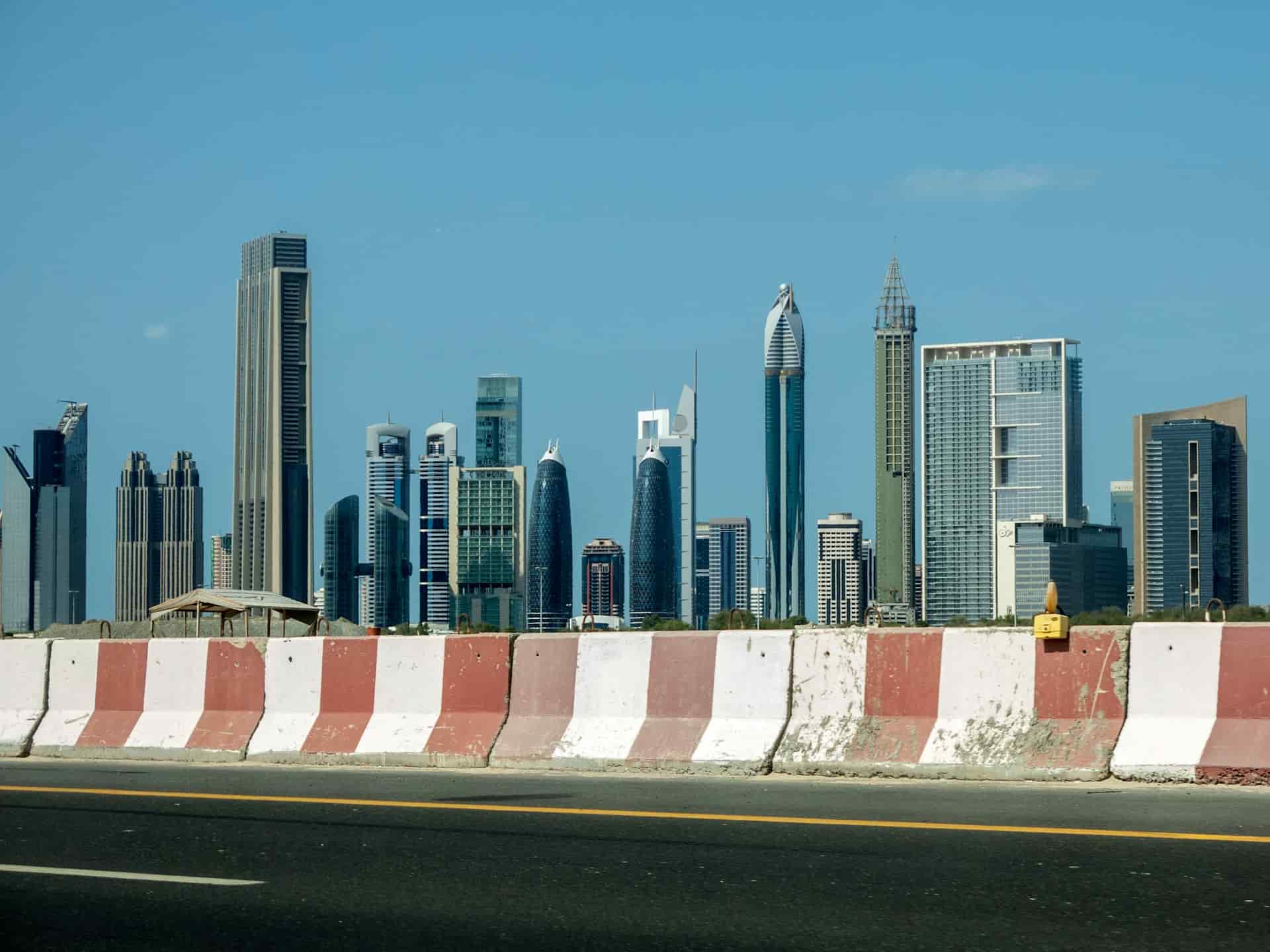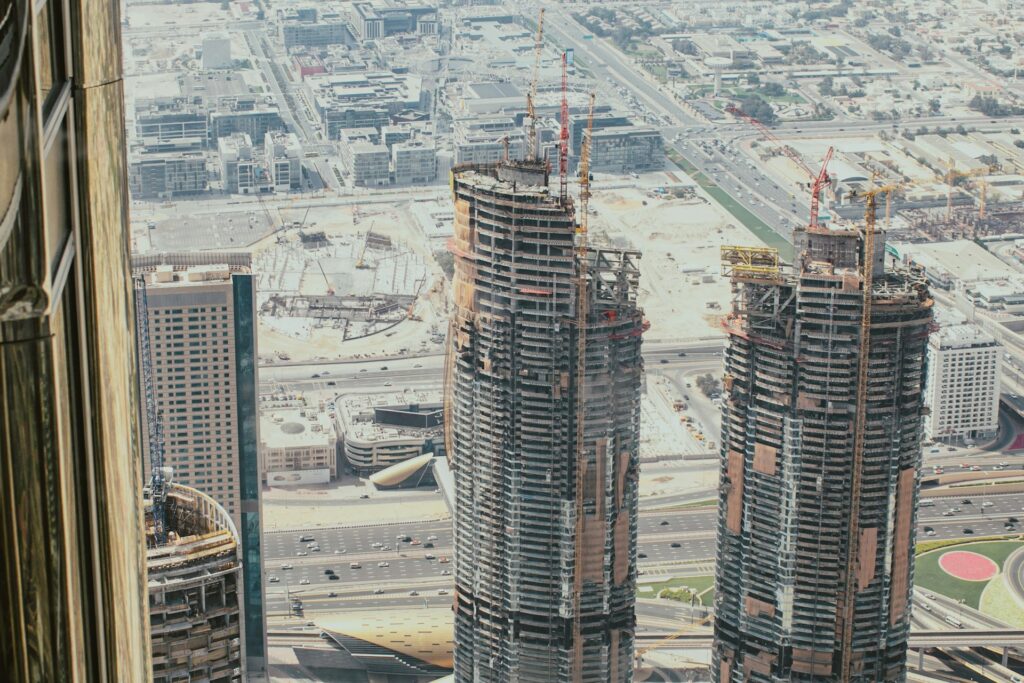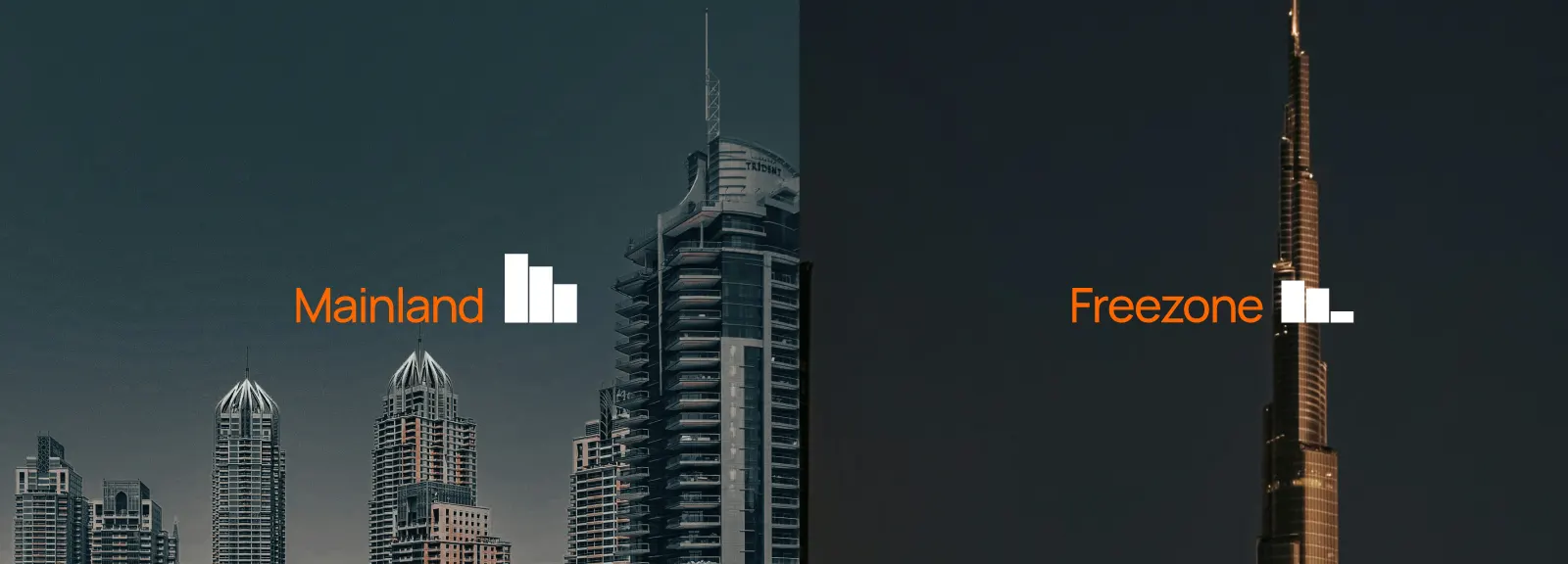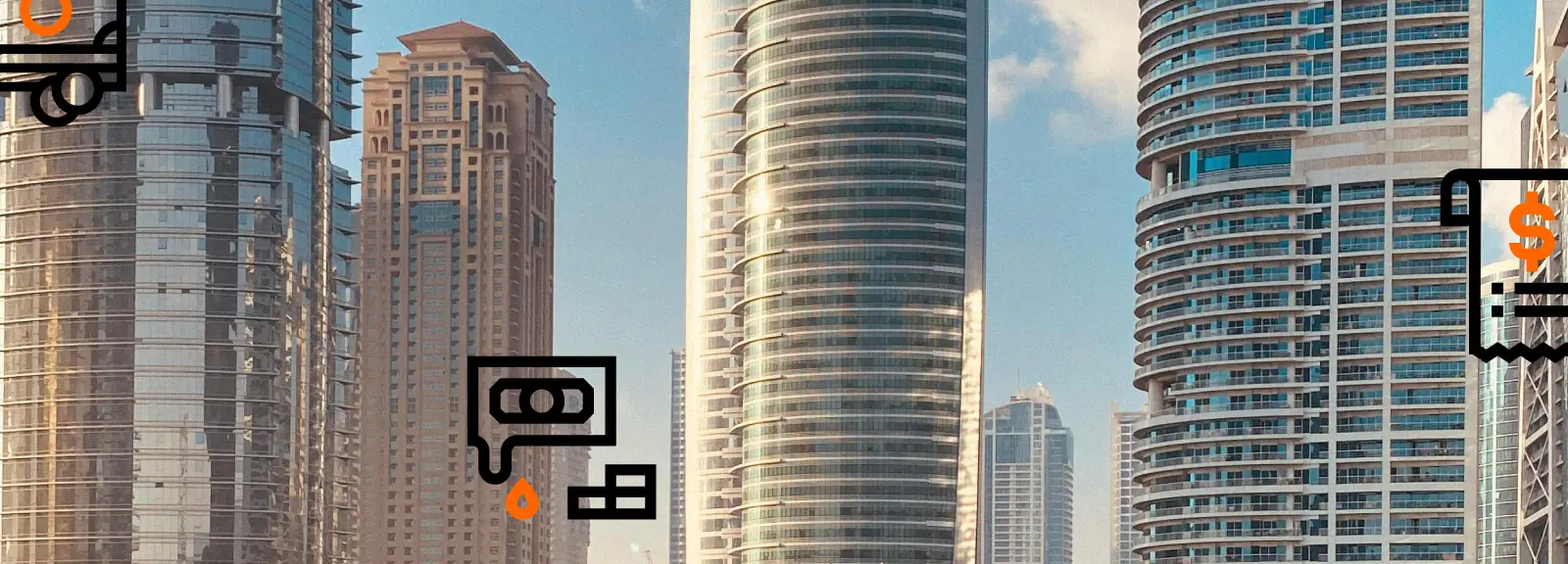Dubai is a top choice for starting a business. It's well-connected to markets across the Middle East, Africa, and Asia. One of the first things you’ll need to decide is whether to set up in a Free Zone vs Mainland Dubai. Both options come with benefits and trade-offs. This guide breaks down what matters most so you can choose based on what fits your business goals.
Table of Contents
What Is a Mainland Company in Dubai UAE?
A Mainland company is registered with Dubai’s Department of Economic Development (DED). It allows you to do business across all emirates and internationally. You can also work with both government and private clients.
Companies registered in mainland Dubai offer full flexibility. You can trade anywhere in the UAE and abroad. As of 2024, the UAE’s non-oil economy reached AED 981 billion—75% of the total GDP. That’s a massive market.
Over 117,000 Emiratis now work across 22,000+ private sector firms on the Mainland. This shows how important this part of the economy is. The UAE also brought in AED 112 billion in foreign investment in 2024, placing it second worldwide. That’s a strong sign of trust in its economy and stability.

Best-Suited Business Types for Mainland Setup
Mainland is best for businesses that rely on operating within the UAE market or need to work directly with clients and suppliers across the country. These include:
- Retail stores and restaurants that require a storefront or serve walk-in customers
- Construction and real estate firms involved in on-site projects
- Manufacturing and industrial setups needing warehousing and distribution
- Medical clinics and health services catering to UAE residents
- Event and entertainment companies organizing physical experiences
- Professional services like legal, accounting, or recruitment agencies
If you want to hire a bigger team, lease a full office, and go after government or corporate contracts in the UAE, Mainland is the better match. It’s about reach, scale, and presence.
Key Features of Mainland Setup
- Full UAE Market Access
- 100% Foreign Ownership (in most sectors)
- Physical Office Required (minimum 200 sq. ft.)
- Visa Quotas based on office size
- Can Apply for Government Contracts
- Annual Audits Required
What Is a Free Zone Company?
Free Zone companies are registered in one of Dubai’s 40+ special economic zones. These zones are built around specific industries like tech, media, health, and logistics. Each zone has its own authority to handle licensing and compliance.
Free Zones are great for international business and remote operations. They offer fast business setup, less paperwork, and full foreign ownership. In 2024, Free Zones contributed over 40% of the UAE’s exports. DMCC alone hosts more than 23,000 businesses and has been named the top Free Zone globally—nine years in a row.
Best-Suited Business Types for Free Zone Setup
Free Zones are ideal for businesses that operate online, serve clients abroad, or don’t need a physical store in the UAE. These include:
- E-commerce stores targeting customers outside the UAE
- Consultants and freelancers in tech, design, or marketing
- Media and content creators like production studios or digital agencies
- Software and app developers building scalable digital tools
- Trading companies using Dubai as a global hub
- Online training and education providers
If your focus is low overhead, fast setup, and international growth, Free Zones are the way to go.
GCG Structuring helps cut through the complexity—advising you on the best setup, handling all paperwork, and keeping your business fully compliant with UAE laws. Whether you’re leaning toward a Free Zone or Mainland license, we make the process simple and clear.
Key Features of Free Zone Setup
- 100% Foreign Ownership
- 0% Tax for Qualifying Businesses
- Virtual or Shared Offices Available
- Limited UAE Market Access (without a distributor)
- Visa Caps Based on Office Type
- Streamlined Setup Process
Free Zone vs Mainland Dubai: Side-by-Side Comparison
| Criteria | Mainland | Free Zone |
| Ownership | 100% foreign ownership (sector-dependent) | 100% foreign ownership universally |
| Market Access | Entire UAE + international | Free Zone + international (needs agent for mainland) |
| Office Requirement | Mandatory, min. 200 sq. ft | Flexible (virtual offices, flexi-desks often allowed) |
| Visa Limits | Based on office size; no fixed cap | Capped by Free Zone policy |
| Setup Time | ~3–4 weeks; may require shareholder presence | ~1–3 weeks; often remote setup possible |
| Audit Requirement | Mandatory annual audit | Depends on Free Zone; required for tax benefits |
| Min. Share Capital | AED 150,000–300,000 (varies by emirate) | AED 50,000–1,000,000 (zone-dependent) |
| Corporate Tax (2025) | 9% on profits > AED 375,000 | 0% for Qualifying Free Zone Persons; 9% otherwise |
| Government Contracts | Eligible | Not eligible |
When to Choose a Mainland Setup
Choose a mainland license when your business goals match the real advantages in the free zone vs mainland Dubai comparison:
- Your clients are in the UAE
- You want to open branches across the country
- You plan to apply for government contracts
- You expect to hire many employees

When to Choose Free Zone Setup
A Free Zone setup makes sense if you’re weighing the pros and cons in the Free Zone vs Mainland Dubai decision:
- You focus on international or online business
- You want a low-cost startup route
- You don’t need a physical space in the UAE
- You want tax relief and a simpler setup
Free Zone vs Mainland Dubai: What to Consider Before You Decide
Choosing between a Free Zone vs Mainland setup in Dubai directly impacts how your business operates, grows, and scales in the UAE. While both offer 100% foreign ownership and access to key markets, they differ in how easily you can expand. Mainland setups allow you to open offices across any emirate, serve a broader client base, and bid for government contracts—ideal for businesses with plans to grow locally. Free Zones, on the other hand, are well-suited for companies focused on international trade or operating within a specific industry. Understanding these differences is key to building a structure that supports your long-term goals.
Below are four critical elements to evaluate as part of your free zone vs mainland Dubai decision-making process.
1. Your Business Activity
Business activity plays a big role in deciding where to set up. Some sectors—like real estate, retail, construction, and government contracting—are generally restricted to the Mainland, where businesses can operate across the UAE. Others, such as consultancy, digital marketing, tech, e-commerce, and media, often benefit from Free Zones, thanks to faster licensing and fewer regulatory steps. That’s why, in the Free Zone vs Mainland Dubai decision, it’s important to choose the jurisdiction that not only supports your activity legally but also aligns with your operational model and market focus.
2. Budget Planning & Capital
Free Zones generally offer a more cost-effective route to business setup, with many providing startup-friendly packages that include shared workspaces or virtual offices. These arrangements significantly reduce upfront investment. Mainland companies, by contrast, are required to lease physical office space—usually a minimum of 200 square feet—which results in higher establishment and operational costs. If budget constraints are a primary consideration, Free Zones may offer a more financially sustainable entry point in the context of free zone vs mainland Dubai evaluations.
3. Operational Flexibility and Reach
Mainland companies benefit from the ability to operate throughout the UAE without geographic restriction and can participate in public tenders, government contracts, and onshore commercial engagements. Free Zone entities, while often easier and quicker to establish, are limited to operating within their respective zones and internationally unless a local distributor is appointed for mainland activities. For businesses intending to scale within the UAE, the Mainland presents fewer limitations. This distinction should be weighed carefully during the free zone vs mainland Dubai assessment.
4. Ownership Structure and Legal Autonomy
Thanks to recent ownership reforms in the UAE, both Free Zones and the Mainland now allow 100% foreign ownership across many sectors. That said, the exact rules can vary depending on your business activity and the licensing authority involved. Free Zones generally provide full ownership more consistently, especially for service-based or digital businesses. On the Mainland, certain specialized or high-regulation sectors may still require additional approvals or local involvement.
That’s why understanding the legal and regulatory framework is so important when weighing your Free Zone vs Mainland Dubai options. Your choice will shape how much control you retain, how you operate, and which markets you can serve.
In many cases, the decision between a free zone vs mainland Dubai structure also affects how quickly you can launch and how easily you can scale. Free Zones typically offer a streamlined setup, while the Mainland gives broader access to the local economy.
Ultimately, choosing between a Free Zone vs Mainland Dubai setup comes down to aligning your structure with your business model, long-term goals, and regulatory obligations. A well-informed decision here sets the foundation for sustainable, compliant growth in the UAE. If your focus is rapid international expansion with fewer upfront costs, Free Zones provide a streamlined and flexible route. However, if you’re targeting the domestic UAE market and government clients or plan to scale locally, the Mainland offers unmatched market access and long-term infrastructure.
Free Zone vs Mainland Dubai: Business Setup Action Plan
Step 1: Identify your primary target market (UAE local vs. international).
Step 2: Determine required business activities and check regulatory permissions.
Step 3: Calculate your setup and operational budget.
Step 4: Decide on the level of control, scalability, and visa requirements.
Step 5: Consult with GCG Structuring for a tailored, tax-optimized business setup strategy aligned with the latest UAE laws.
Making an informed decision between free zone vs mainland Dubai on these criteria will ensure your business is structured for success and compliance from day one.
Want more guidance? Check out our article on how to start a business in Dubai—it’s a quick, helpful read.
Final Thoughts
The choice between setting up your business in a Free Zone vs Mainland Dubai hinges on your business model, customer base, and long-term goals. While Dubai Free Zone company formation provides ease, speed, and affordability, Mainland companies offer broader access and scalability. For many investors, a hybrid approach—starting in a Free Zone and later expanding to Mainland—is also viable.
Partnering with experienced consultants like GCG Structuring can make your business setup in Dubai seamless and aligned with UAE legal frameworks through a tax-optimized approach. Always assess your options carefully to leverage the UAE’s pro-business environment to its fullest.





